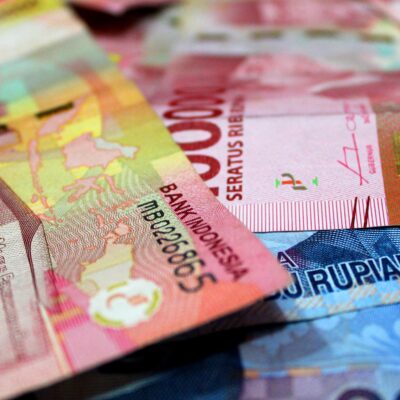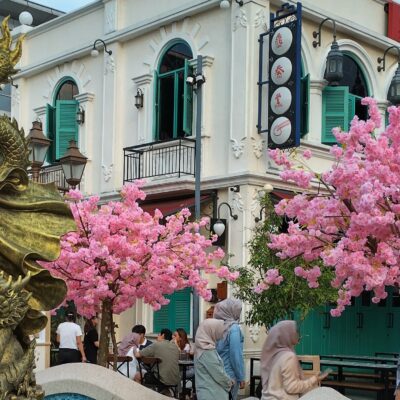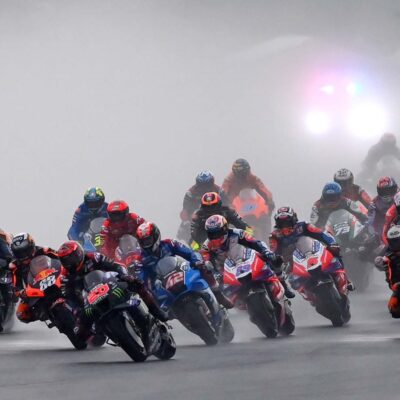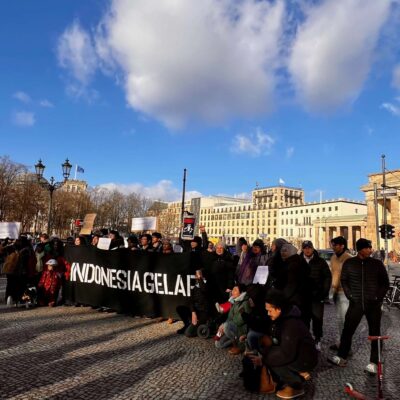Intolerance of non-conventional sexual and gender identities and diverse genders and sexual orientations in Indonesia seemingly remains stubbornly high.
The results of a survey in 2016 conducted by Indonesia’s Wahid Foundation showed that just over 26 percent of Indonesians ‘disliked LGBT people’; and a 2020 survey by the Pew Foundation found that only nine percent of Indonesians agreed with the statement that homosexuality should be accepted.
Dr Dédé Oetomo is an activist and founder of the GAYa NUSANTARA Foundation, Indonesia’s longest running gay rights organisation, and an Adjunct Lecturer in gender and sexuality at Universitas Airlangga.
He spoke with Melbourne Asia Review’s managing editor, Cathy Harper.
How would you describe the legal and social reality of LGBTIQ+ Indonesians?
It is ugly. For example on Valentine’s day, in many small towns, and not-so-small towns, the so-called public order police, or sometimes the proper police, go from hotel to hotel—cheap ones, they would not go to the Marriott or the Hyatt—and raid rooms that might have a man or woman, or increasingly they will target rooms where two men have checked in because they might be gay. That is actually unauthorised. And there are local ordinances of local governments in relation to planning ‘rehabilitation centres’, which involves conversion therapy, who think they’re doing gay men, lesbians and trans people a favour by trying to change them. The whole frame of mind is completely wrong and in many parts of the government it’s used as a way of gaining support from conservative voters, even without an election going on. My organisation had an event to celebrate Independence Day in August with a gay activist and the neighbours near the location of the event came together with a village head and with police and said ‘this cannot happen’. This actually happened on Independence Day, which is so ironic because it’s like the Dutch police breaking up a Nationalist meeting before independence.
Do you expect that conservative Islamic political parties will use LGBTIQ+ issues to gain votes in a significant way in the lead up to the election in February?
In 2019 they didn’t use it as much as in 2014. Actually, the peak year of homophobic, transphobic hate speech was 2016—most ministers, members of Parliament were conservative and they had to make a statement. Interestingly, the Minister of Religious Affairs stated that the rights of LGBTIQ+ people should not be violated because they are also citizens, but he said that we should get them on the ‘right path’. He was then labelled in the Islamist press as the ‘Homo Minister’. The situation is pretty bad. In some parts like Aceh and West Java the situation is even more conservative, but it also happens in cities such as Jakarta and Yogyakarta.
It is just about impossible to do public events of any kind, especially relating to trans women even though it’s been tradition since the 1960s to do pageants. Even in the 1990s in Surabaya there was a drag show every Thursday evening in an amusement park attended by just about everybody. It was advertised in the newspaper and there was a big banner outside of the amusement park. I used to take Australian HIV consultants there and say ‘this is Mardi Gras every week!’. The wider community would go and enjoy it, but now it’s impossible to do it. In Bali there’s a gay strip (don’t call it that, but it’s there) I suspect that protection money may be paid. But even in Bali, there have been events that had to be cancelled, although the last pride month celebration was allowed, but that’s Bali and there’s no guarantee it will happen again. So that’s the situation: nothing public. Even if you do a training workshop if you are unlucky there will be a conservative group that notices and if they see trans women or anyone gender non-conforming they might be reported to the police. What’s very scary is that some private events have also been raided. It could be just a group of guys hanging out in somebody’s flat, this happened in downtown Jakarta, actually, in a middle class flat, they were raided and the police came with reporters. They wanted to be the moral guardians of society. Sporadically, there are people who have been told to leave a certain neighbourhood. One couple who were renting in an upper middle class area of Jakarta were called in by the neighbourhood chief who said ‘you can’t be here. We know you’re gay.’ The couple could have actually challenged that in court, but then it would have been in the media and so they decided to just move.
Many families know or suspect that their child may be gay, lesbian, trans, or non-binary they will either call a pastor if they’re Christian or get some shaman or an Islamic cleric to get rid of the ‘demon’ or undertake conversion therapy. It’s scary. Sometimes trans kids have to leave home because a relative, or even their own parents, could be violent. There’s not been much research done on levels of violence. As far as I know, they only research that has been done is by the Asia Pacific Transgender Network, but it’s hard to be quantitative. We have tried to train activists in different organisations to monitor and report cases of violence. But it it’s not easy and we don’t really have the data.
What about the state of HIV/Aids infection in Indonesia?
It is still rising amongst the gay male community. In Indonesia the HIV statistics are separated between Papua provinces because there it is a generalised epidemic and I think the prevalence is about 2.5 percent of the population which is pretty high. The difficulty with the data is that very few gay men would admit that they are gay. In the rest of Indonesia, the rate of HIV/AIDS infection is still rising. I’m not an epidemiologist, but as far as I understand it will probably start leveling by the end of next year. I still hear about gay men who have died of AIDS. Interestingly amongst the trans women community it has levelled out. My thinking is that if you are trans you are visible anyway and you can’t hide behind some sort of ‘normality’. For gay men it’s scary to be out because even in health centres some workers are homophobic and there is a fear that if they go to the clinic then their parents or siblings might find out. So we, for example, don’t even produce HIV information brochures because they’ll be thrown in the bin, but fortunately there are some people who are brave enough to go to voluntary testing which is available, mostly for free, at government health centres. If you are connected to a gay organisation or LGBTIQ+ organisation, you’re more likely to be alright. Even if you’re HIV positive you can get your antiretrovirals (ARV) and pre-exposure prophylaxis (PrEP) is being tried by the Ministry of Health. We have reason to believe that people who are upper middle class, who have the money, will go to private clinics in Bali and Jakarta. The very rich go to Bangkok to get their three month supply of ARV or get tested. During the pandemic that was impossible and actually many of the HIV services were cancelled because the nurses were busy vaccinating people with the COVID-19 vaccine. But that’s over now and things are getting back to normal.
Will same sex marriage ever be allowed in Indonesia?
In my optimistic moments, I would say that it’s possible. In the 1920s and 1930s and you wanted an independent Indonesia people would think you were crazy. The Dutch Intelligence Police would harass you and would probably throw you into exile and things like that. It was regarded as impossible. It took a crisis, World War II and the Japanese occupation, to become independent; and it’s not perfect, but we’re there. So I’d say, you know, with a few caveats, it could happen.
Indonesia is a very religious country. The President was very proud the other day saying ’93 percent of our population believe in God’. But then what percent of our officials are involved in or in jail for corruption? More seriously, there are people in faith communities, Muslim and Christian, who are working to develop a more humanist, more progressive, way of being religious. If these people are successful, that’s a big ‘if’, then we can see an Indonesia in 30 or 40 years which is more humane. That’s one possibility. There’s no hope for the politicians at the national level, but in eastern Indonesia there are little towns like Ternate, Ambon, Kupang, and Maumere, where at least some local ordinances are being discussed to protect so-called vulnerable populations—I checked the text for the one in Ambon and it doesn’t mention LGBTIQ or gender. It seems the one in Kupang may include that language. In 2020, there was a proposal by a Conservative Islamist party in Parliament in 2020 for a bill on so called family resilience. So if you, as a parent, know that your child is trans or is going to be trans, and you don’t report it to the authorities, you will go to jail. This bill failed.
Our human rights activists are actually, I think, some of the best in the in the region. At a national level they talk about a Bill to protect vulnerable populations in relation to sexual orientation and gender. You have to push the State and you have to protest. Eventually, if people like me succeed in educating the younger generation to be more accepting. I mean, if you look at Australia, at the first Mardi Gras in 1978 more than 50 people were arrested and their names were published in the Sydney Morning Herald. But 45 years later there is Mardi Gras and it’s pretty safe. Nepal already allows same sex marriage by a decree of the Supreme Court, although apparently some local marriage registration offices refuse to abide by it. Thailand might be next and we were hoping that the Move Forward party would actually rule. In Indonesia we have religion and Thailand has the military. It’s not easy.
Are you seeing more inclusivity in ordinary young people’s friendships or within their families?
Yes, certainly among the people who come to my classes, but my classes are optional and so they self-select. But there are young people who would come to my house and ask timidly to talk gender and sexuality, and then later they admit they were all queer, so these people exist. Of course, other kinds of people also exist. Comments on social media, even in relation to something on the BBC Indonesia or the ABC the comments are scary because they are really very hateful. But then they’re not original, they’re ignorant. I hope that by educating people they become less dominant.
What’s the general picture in Indonesia with regard to sex education in schools and education about sexuality and gender?
Almost none. If at all there will some ‘life skills’ education. If you’re unlucky your teacher might say ‘wait until you’re married when you are adults and have children’. There’s resistance, there is an increasing child-free community and people who do not want to get married. But I know an unmarried heterosexual couple who have had difficulty renting a place because they don’t want to be reported or thrown out. Thankfully, there is the internet where there is all kinds of information. When I was that that age it was hard to find anything. My organisation is known, at least in Surabaya, by certain high schools and some actually invite our activists to talk. But mostly you cannot do it openly, it has to be underground. We call it guerilla warfare.
Can you talk a little bit about whether you think democracy in Indonesia has helped or hindered the cause of people with diverse sexualities and genders?
It has certainly helped. It’s not perfect and things are looking bleak next year with the national elections. But if let’s say, my organisation is closed by the government, we could go to our mainstream human rights defender allies, and they will protest, so I don’t think it will happen.
You argue that same-sex gender relations are accepted in Islam. What do you base that on?
It is a very controversial thing to say. But there are queer Muslim activists who interpret the holy texts and a young Muslim scholar, Aan Anshori, who is an ally and who wrote his thesis on the possibility of same sex marriage within Sharia. The idea is based on that same sex marriage is based on love and who are we to condemn love, which is a gift of God? It’s a minority view, but it’s there and its growing. I’ve seen it grow since the early 2000s.
In the Islamic jurisprudence there is actually a mention of intersex. Allah created males and females and intersex. There was at least one trans woman in the household of the Prophet, we even know their name. And there is another story that I was told by Anshori. One day a man came to the Prophet and said ‘I like that man over there, he’s so handsome and the Prophet said ‘ this guy likes you!’. It’s there but people like to cherry pick in religion. In relation to the Bible people find it difficult, the interpretation, and they just want something easy. My faith colleagues who are humane and progressive are trying make people think. Apparently, it’s actually a duty for Muslims at least, that you have to use your right reason, you’ve got to think about your faith.
What do you think about the language of human rights? Do you think that’s a useful way to improve the situation of people in the LGBTIQ+ community?
There is such a strong anti-West feeling in Indonesia amongst many people, not only Muslims, but ethnic Chinese tend to side with China’s President Xi Jinping and think that the West is terrible. Certainly, for me, I’d rather be with the West because my rights as a gay person are there. I can’t imagine living in China. They have started blocking the social media accounts of LGBTIQ+ groups and other so called ‘problematic’ populations. Many in Indonesia like the Russians. They want a strong man and they think democracy is messy. We just have to educate people.
Can you reflect on the fact that you’ve been one of the most influential activists in Indonesia in this space since the 1980s and I wondered how strong and healthy you thought LGBTIQ+ activism is in Indonesia currently.
I think it’s quite robust. We’re not like the Philippines, where they are even stronger than us. But when I sit down with people from Myanmar, from China they are envious. They envy that we are able to exist and that we specifically mention our work in our founding documents and speak about human rights and gender. As far as I know only two LGBTIQ+ specifically mention that word in their founding documents. For the others, we are taught by the officials in the Ministry of Law and Human Rights to call ourselves a ‘social organisation trying to help humans.’ Not even the phrase ‘human rights’ or ‘gender’ is used. It’s actually quite simple: it’s cheesy but if you follow your heart and if think you should be trans or non-binary however much oppression there is, you’ll try to survive. We can see this among the trans women of Aceh. They’re still there. When I started there were maybe three to five organizations and now we have more than 100. I am optimistic.
Image credit: Ikhlasul Amal/Flickr.




